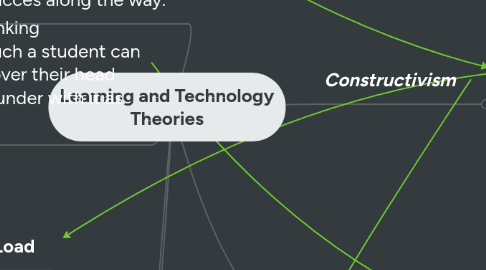Learning and Technology Theories
by Diana Reis

1. Theory of Teachnology
1.1. Teachers use this similar to their Philosophy of teaching.
1.2. Teachers use this Philosophy in adding what their personal link, and desires are to integrate technology in their teaching.
2. TPACK
2.1. Uses 3 elements to teaching
2.1.1. Technology
2.1.2. Content
2.1.3. Pedagogy
2.2. Teachers find a perfect blend of all 3 elements to teach in the best possible and full manner.
3. Cognitive Load
3.1. The over loading of information at once.
3.2. Our working memory can handle about 7 pieces of information at one time.
3.3. Positive re-inforcement involves stimuli, that aims to increase the possibility of a certain response.
3.4. Three types of cognitive load: extrenous, germane, and intrinsic.
3.5. An implication to this theory: The brain handling only so much at a time, takes time for educators to understand and pass on knowledge to their students. Same then for students to only grasp small pieces of information at a time. This can cause a slow moving classroom for some who may grasp information at a faster rate then some. Differentiation of assignments or homework may be needed.
4. Connections Between Theories: CONNECTIVISM & CONSTRUCTIVISM These two theories I believe go hand in hand because of the students building upon themselves their understanding of education, and also using technology to gain this education they are building for themselves. These two theories can be linked because of the parallels they use. Scaffolding, Schema building and then connecting it all together to achieve a greater understanding of what is being asked of them to learn, not only what the educator has instructed. I also think that COGNITIVISM plays a part in this as well. While students are building their information, a teachers' job is to ask the questions and make sure all is being understood, and supporting the challenges, failures and succes along the way.
5. Connection Between Theories: COGNITIVE LOAD & BEHAVIOURISM I see these two theories linking because of the amount of mental work used. I see a strong tie between how much a student can injest mentally to then his/her behavior reacting as such. If a student in in way over their head with too much overload or underload of information, the behavior usually goes under with it as well.
6. Cognitivism
6.1. Focuses on the processes for learning ex:thinking, memory, knowledge, and problem-solving.
6.2. Knowledge is learned, and changes knowledge therefore making changes in behaviour possible, opposite of behaviours being learned.
6.3. Educators must ask lots of questions of students to verify learning is actually taking place.
6.4. Focuses on inner mental workings, the knowledge process is the portion that is being developed and understood.
6.5. An implication of this theory: With the focus being on the process, what type of result will be seen. In education, the results are the most important ex: final exams. projects. This may hurt these results because of focusing solely on the process of understanding as opposed to understanding and finishing the education with something accountable.
7. Connectivism
7.1. Connecting information from previous experiences
7.2. Because of the constant growth of technology, educators must keep up on the current trends to facilitate teaching and learning for their students.
7.3. By creating and maintaing connections with professionals etc., the student can access a plethora of knowledge that may have been difficult to establish if these connections had not been made.
7.4. Process in sometimes more important then the end result. By researching, this may facilitate the learning of a particular topic because of the connection between the two.
7.5. An implication to this theory: For education with this theory is if networking is not a forte for studnets and educators, there is a negative situation where the knowledge growth is cut significantly. By not reaching out into a network, the educators looses also alot of connection with students. By the technology building at such a fervorous state, when is technology too much?
8. Constructivism
8.1. Building upon previous experiences positive or negative.
8.2. The learner constructs his/her own knowledge.
8.3. Students are responsible for their own leaning.
8.4. Creating authentic learning, by students creating their own learning and learning from the positive and negative aspects.
8.5. An implication to this theory: Students being responsible for their own education can also make them not take charge and therefore lack in their learning and skill building. By giving them "freedom" to build they may wait until the final moments and hurt themselves by slacking at their growth process. In the same way educators may become complacent to allowing students to roam and build, they may loose their focus as well. On the other hand, independent learning and building upon their own work causes the students to feel more connected to their work, making it seem as they are learning in various aspects, not just simply regurgetating the information handed to them
9. Behaviorism
9.1. Behaviour is completely influenced by outside environment.
9.2. Focusing on behaviour not thought processing.
9.3. The brain is a blank slate, and therefore behaviours desired can be learned and un-learned by negative reinforcement.
9.4. Positive re-inforcement involves stimuli, that aims to increase the possibility of a certain response.
9.5. An implication of this theory: Teachers may be offering negative reinforcement to change behaviour, but this can then be learned by the student, and the educator may then take their time in asserting a decision therefore making the behavior an even greater issue to handle when it could have been erased early on and properly.


